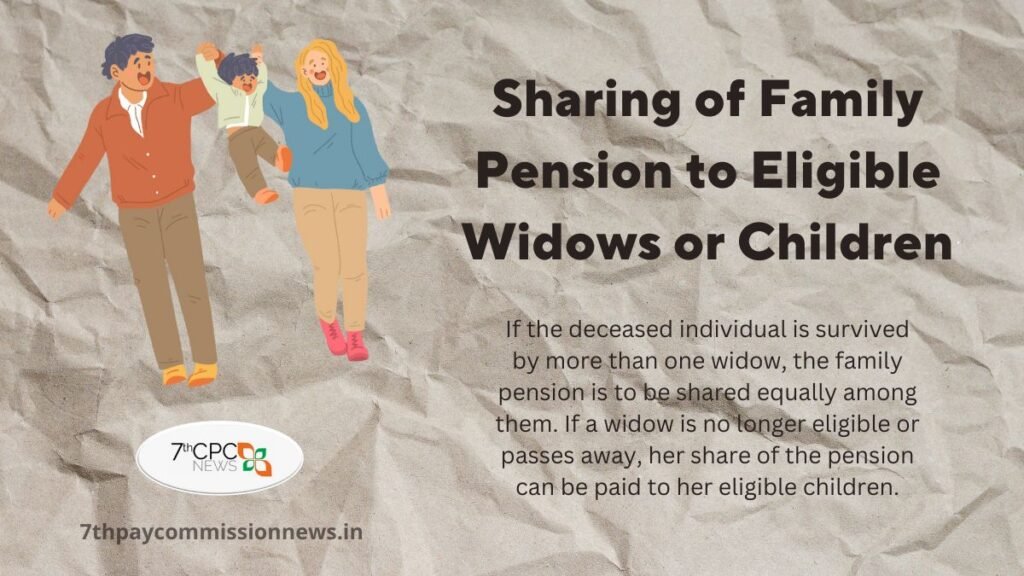“Family Pension Sharing for Widows & Children”
The Central Civil Services (Pension) Rules, 2021 have a provision (Rule 50(8)) for the sharing of family pension in the event of the death of a Government servant/pensioner. The widow/widower is entitled to receive a family pension until the date of death or remarriage, whichever happens earlier. If the deceased individual is survived by more than one widow, the family pension is to be shared equally among them. If a widow is no longer eligible or passes away, her share of the pension can be paid to her eligible children. If there are no eligible children, her share of the pension will be distributed equally among the remaining widows or in full to the only surviving widow.
The Department of Pension and Pensioners’ Welfare (DoPPW) recently released an order specifying the specifics of distributing family pension among qualifying widows or children.
Check | DA Hike News for Central Government Employees Latest Today Updates
F. No. 1/1(1))/2022-P&PW (E)
Government of India
Ministry of Personnel, PG & Pensions
Department of Pension & Pensioners’ Welfare
3rd Floor, Lok Nayak Bhawan
Khan Market, New Delhi-110 003
Dated: 26.10.2022
Office Memorandum
Subject: Sharing of family pension under Central Civil Services (Pension) Rules, 2021
The undersigned is directed to say that Department of Pension has notified the Central Civil Services (Pension) Rules, 2021 in supersession of the Central Civil Service (Pension) Rules, 1972. Rule 50 of the Central Civil Service (Pension) Rules, 2021 deals with payment of family pension on death of a Government servant/pensioner.
2. In accordance with Rule 50(8) of the Central Civil Service (Pension) Rules, 2021, on death of a Government servant/pensioner, family pension is payable to the widow or widower upto the date of death or re-marriage, whichever is earlier. In cases where the deceased Government servant or pensioner is survived by more widows than one, the family pension shall be paid to the widows in equal shares and on the death or ineligibility of a widow, her share of the family pension shall become payable to her child or children who fulfill the eligibility conditions for grant of family pension. In case, the widow is not survived by any child, her share of the family pension shall not lapse but shall be payable to the other widows in equal shares, or if there is only one such other widow, in full, to her.
Check | 7th Pay Commission Pension Calculation
3. In cases where the deceased Government servant or pensioner is survived by a widow without any child and has also left behind eligible child or children:
(a) from another wife who is not alive, or
(b) from a divorced wife, or
(c) from a void or voidable marriage
the child or children who fulfill the eligibility conditions for grant of family pension shall be entitled to the share of family pension which the mother would have received if she had been alive at the time of the death of the Government servant/pensioner or if she had not been so divorced or if the marriage had not been void or voidable. On the share or shares of family pension payable to such a child or children or to a widow or widows ceasing to be payable, such share or shares shall not lapse, but shall be payable to the other widow or widows and/or to other child or children otherwise eligible), in equal shares, or if there is only one widow or child, in full, to such widow or child.
4. In the above cases, if the deceased Government servant/pensioner is survived by the widow with child or children eligible for family pension, on the share of family pension payable to the widow ceasing to be payable, such share shall be payable to her child or children in accordance with Rule 50.
5. In cases where family pension is payable to twin children, it shall be paid to such children in equal shares and when one such child ceases to be eligible, his or her share shall revert to the other child and when both of them cease to be eligible the family pension shall be payable to the next eligible single child or twin children.
6. In accordance with Rule 63, on retirement of a Government servant, the name of the spouse of the Government servant, if alive, is indicated as family pensioner in the Pension Payment Order. In cases where family of a Government servant includes more than one wife who is alive, the Accounts Officer shall indicate, in the Pension Payment Order, the names of all the wives with their respective share in the family pension. If family of a Government servant includes a wife, who is alive, and a child or children from a wife who is not alive or from a divorced wife or from a void or voidable marriage, the Accounts Officer shall indicate, in the Pension Payment Order, only the name of wife who is alive with her share in the family pension, then on death of the pensioner, the share of family pension indicated in the Pension Payment Order shall initially become payable to the surviving widow and on receipt of a communication from the Head of Office, the Accounts Officer shall issue a revised Pension Payment Authority, indicating the names of all the members of family who are eligible for family pension on the date of death of the pensioner with their respective share in the family pension, in accordance with rule 50.
Click to view the order in PDF

The purpose of sharing family pension to eligible widows or children is to provide financial support to dependents after the death of the pension holder.
Eligible widows or children of the deceased pension holder are eligible to receive the shared family pension.
The family pension is generally shared equally among all eligible widows or children. However, specific rules may vary depending on the country or pension scheme.
Widows or children may need to meet certain criteria such as age limits, dependent status, or marital status to be eligible for shared family pension. These criteria can vary depending on the pension scheme and jurisdiction.
The shared family pension is calculated based on the pension holder’s years of service, average salary, and any relevant formulas or regulations outlined in the pension scheme.
Some pension schemes may provide additional benefits or provisions, such as healthcare coverage, education support, or cost-of-living adjustments, to eligible widows or children receiving shared family pension. These specifics can vary based on the pension scheme and country of residence.
To apply for shared family pension, widows or children usually need to submit necessary documents and forms to the relevant pension authority or administrator. It’s important to follow the specific instructions and requirements outlined by the pension scheme.
The shared family pension can be revoked or discontinued if the eligible widow remarries or the eligible child becomes self-sufficient. This is typically outlined in the pension scheme rules and regulations.
The time limit for claiming shared family pension can vary depending on the pension scheme and jurisdiction. It is important to inquire about any applicable deadlines and submit the required documents within the specified timeframe.




Leave a Reply